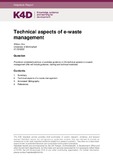Technical Aspects of e-Waste Management
Abstract
Population growth, increasing prosperity and changing consumer habits globally are increasing demand for consumer electronics. Further to this, rapid changes in technology, falling prices, increased affordability and consumer appetite for new products have exacerbated e-waste management challenges and seen millions of tons of electronic devices become obsolete. This rapid literature review collates evidence from academic, policy focussed and grey literature on the technical aspects e-waste value chains. The report should be read in conjunction with two earlier reports on e-waste management1.
E-waste is any electrical or electronic equipment, including all components, subassemblies and consumables, which are part of the equipment at the time the equipment becomes waste. The exact treatment of Waste from Electrical and Electronic Equipment (WEEE) can vary enormously according to the category of WEEE and technology that is used. Electrical and electronic items contain a wide variety of materials. As a result of this complex mix of product types and materials, some of which are hazardous (including arsenic, cadmium, lead and mercury and certain flame retardants) multiple approaches to WEEE are required, each with specific technical guidelines. This report is structured as follows:
Section two provides an introduction to the technical aspects of e-waste management, including a reflection on the challenges and complexities of managing a range of product types involving a range of components and pollutants.
Section three provides an annotated bibliography of key readings that discuss elements of the technical aspects of managing e-waste. This bibliography includes readings on national guidelines, training manuals and technical notes produced by the Basel convention and courses.
WEEE recycling can be a complex and multifaced process. In order to manage e-waste effectively, the following must be in place
Legislative and regulatory frameworks
Waste Prevention and minimisation guidelines
Identification of waste mechanisms
Sampling, analysis and monitoring expertise
Handling, collection, packaging, labelling, transportation and storage guidelines
Environmentally sound disposal guidelines
Management is further complicated by the speed of technological advance with technologies becoming redundant much sooner than initially planned. Case studies show that the average actual lifetimes of certain electronic products are at least 2.3 years shorter than either their designed or desired lifetimes.
Citation
Avis, W. (2022). Technical aspects of e-waste management. K4D Helpdesk Report No. 1098. Institute of Development Studies, DOI: 10.19088/K4D.2022.051DOI
10.19088/K4D.2022.051Is part of series
K4D Helpdesk Report;1098Rights holder
© Crown copyright 2022Sponsor
Foreign, Commonwealth and Development Office (FCDO)Collections
- K4D [937]

